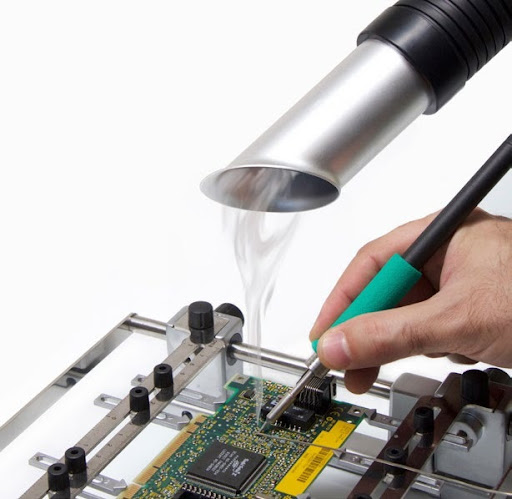
Solder fume extraction regulations: An employer’s responsibilities
Soldering generates fumes that can cause both short and long-term damage to the manual operators, which is why solder fume extraction regulations are essential.
Soldering components to printed circuit boards (PCBs) is a core part of electronics production. Some stages of this process can be automated and completed by soldering machines. However, the majority of the work is done with hand-held soldering irons to add on components. This work generates fumes that can cause both short and long-term damage to the manual operators, which is why solder fume extraction regulations are essential.
How much of a risk are soldering fumes?
Harmful fumes are generated through soldering, rework, and other similar activities like welding and laser cutting. Working with adhesives can also result in the release of hazardous particles. Unfortunately, you can’t just ignore these fumes or open a window and hope for the best.
During the soldering process, fumes will naturally rise vertically, meaning they’ll be directly entering the breathing zone of the operator. In addition to this, other fumes may accumulate in the room, especially if there are multiple operators working in an enclosed area with poor ventilation. The presence of these fumes means that operators will not only be forced to inhale them, but they also could irritate the eyes, skin and cause allergic reactions.
When breathed in, soldering fumes are one of the main causes of occupational asthma in the workplace. With continued exposure to soldering fumes, asthmatic reactions can become increasingly severe. It’s clear to see from this alone that soldering fumes pose a huge risk to operators, especially ones who are regularly exposed to them for extended periods of time.

What are the legal requirements for solder fume extraction?
Because rosin has been directly linked with occupational asthma and dermatitis, soldering extractors must be used to remove fumes when rosin-based flux is being used. Exposure to rosin fumes should always be avoided or kept as low as is reasonably practicable.
The Health and Safety Executive states that following their guidance is not compulsory, however, if you do follow their guidance then you usually will be doing enough to comply with the law. In the interests and safety of those working with soldering fumes, it’s best to adhere to official regulations when it comes to health and safety.
How to choose the right fume extraction system for your workplace?
There’s a lot to consider when choosing a suitable fume extraction system for your place of work:
- Type of fume extraction system
- Type of filter
- Airflow requirements
- Ease of use
- Disposable vs self-cleaning
Every workplace is different, which means that the exact needs for each environment will be unique. That said, there are many powerful fume extraction systems out there that a huge range of workplaces will benefit from.
Make sure you’re safe while soldering
Regardless of your working conditions, fume extraction systems remain the most cost-effective way of dealing with harmful fumes. Not only do they remove harmful particles from the atmosphere, but they also recirculate the cleaned air back into the room. This means that in addition to protecting operators from soldering fumes, they also save energy and cut energy costs.
But most importantly, fume extraction systems keep your operators safe from harmful gases and particles. Here at V Tech SMT, we have vast experience in providing fume extraction systems for a huge range of different working environments. From small-scale operations to nationwide enterprises, we have helped organisations of all sizes to stay safe while soldering.
In our experience, BOFA international provide the best fume extraction systems. BOFA lead the way with their development of powerful and innovative fume extraction systems. Whether you work in electronics production or mechanical engineering, BOFA will have a solution for your workplace.

To find out which BOFA fume extraction system would be best suited for you, get in touch with a member of our team today. We’ll talk you through the options and find the best and most effective product to protect your operators and ensure you comply with solder fume extraction regulations.
